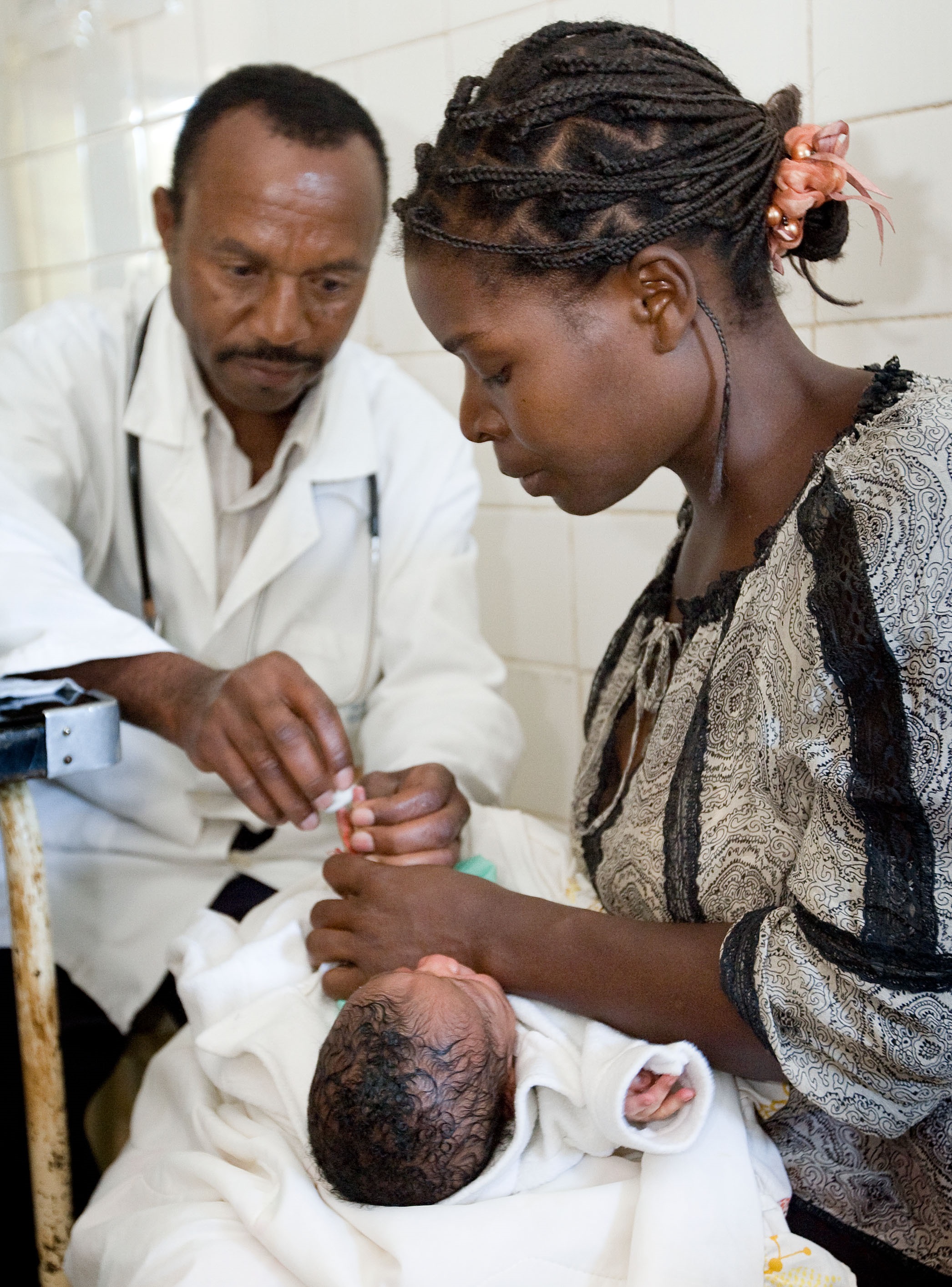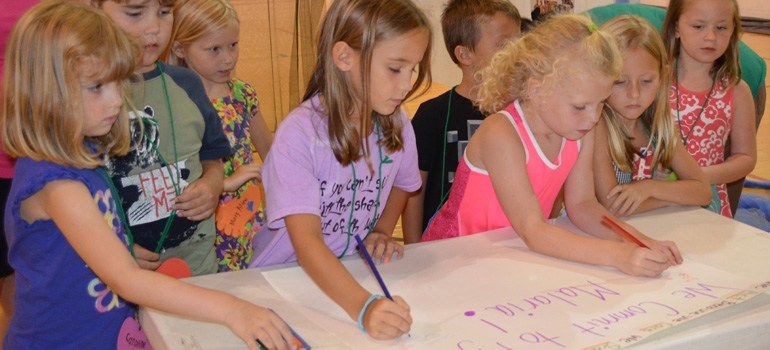




Vaccine a milestone in fight against malaria
The European Medicines Agency in late July approved Mosquirix, a malaria vaccine for children under 17 months from GlaxoSmithKline, for further evaluation. The first news of the vaccine approval was welcomed by those who have fought to end preventable deaths from malaria in Africa.
"The development of this vaccine is an important step in the elimination of malaria-related illness and death across the world," said Bishop Tom Bickerton, chair of the Global Health Initiative for The United Methodist Church.
While a new malaria vaccine for young children is a major breakthrough, United Methodist Church officials cautioned that Imagine No Malaria will need to continue the fight with existing preventative measures.

Read the full article
Vaccine a milestone in fight against malaria by Mahalia Smith
While a new malaria vaccine for young children is a major breakthrough, United Methodist Church officials cautioned that Imagine No Malaria will need to continue the fight with existing preventative measures.
Still, the first news of the vaccine approval was welcomed by those who have fought to end preventable deaths from malaria in Africa.
“The development of this vaccine is an important step in the elimination of malaria-related illness and death across the world,” said Bishop Tom Bickerton, chair of the Global Health Initiative for The United Methodist Church.
The European Medicines Agency in late July approved Mosquirix, a malaria vaccine from GlaxoSmithKline, for further evaluation.
The World Health Organization estimated that 584,000 people died of malaria in 2013; African children under the age of 5 accounted for fourth-fifths of that total. The disease can be prevented by taking measures such as using bed nets and draining stagnant ponds where mosquitoes breed.

Dr. Malaquias Kapawba draws blood for a rapid malaria test at the Benifica Alta health center in Huambo, Angola. 2008 file photo by Mike DuBose, UMNSVaccine only for young children
The vaccine is only for children under 17 months.
“The vaccine provides less than 50 percent protection. [That] is important, but it would still need to be used alongside existing preventative measures. For now, nothing changes in our approach since the vaccine should be used with other preventative measures,” said Dr. Olusimbo Ige, executive director of Global Health at United Methodist Global Ministries.
A spokesperson from GSK said Mosquirix is the first vaccine that attacks the Plasmodium falciparum parasite, which causes malaria in young children. The vaccine, intended for use in babies and toddlers from six weeks to 17 months old, took 30 years to develop. The process included 15 years of lab development and 15 years of clinical trials in eight African countries. Studies show that the vaccine is 27 percent effective in infants and 39 percent effective in children after three to four years of follow-ups.
The next step in approval is for WHO to give recommendations and guidelines for the use of the vaccine. Then GSK will submit Mosquirix to WHO for prequalification, which will assess the safety of the vaccine. Then, countries will have to adopt the guidelines and arrange for distribution with GSK.
“We can only engage in the vaccine procurement when the vaccine becomes part of the approved immunization list of each country,” Ige said.
GSK developed Mosquirix in conjunction with the PATH Malaria Vaccine Initiative, funded since 1999 by the Bill and Melinda Gates Foundation.
Mosquirix is not for travelers, but only for those living in direct risk of malaria.
It is possible that in six to nine months, the WHO will send their recommendation. When distributed, GSK will not profit from the vaccine. The expected 5 percent return will fund further research into malaria vaccines.
“Our ongoing work in Imagine No Malaria remains an important bridge that will continue to provide the needed goods and services necessary until the full development and implementation of a vaccine becomes a reality,” said Bickerton.
So far, the Imagine No Malaria campaign has raised $66 million towards preventing malaria deaths in Africa. Donations are essential for the many preventative measures and treatment options for malaria. The new vaccine does not change Imagine No Malaria’s mission to raise $75 million to decrease death from malaria.
“We are in this work for the long haul,” said Bickerton, “The news of this vaccine helps get us another step on the way to a malaria free world.”
Smith is an intern for United Methodist Communications.Children leading children to fight
malaria in South Carolina

A conference-wide initiative to end death and suffering from malaria is being led by the very group of people it benefits - children. The Rev. Jeri Katherine Warden Sipes, Imagine No Malaria field coordinator for the South Carolina Conference, said three churches each have a team of children and youth who have raised hundreds of dollars for the initiative and one 6-year-old advocate has raised more than $4,000 at her church.Read the full article Children leading children: Fighting malaria South Carolina-style
Jessica Brodie, South Carolina Annual Conference

A conference-wide initiative to end death and suffering from malaria is being led by the very group of people it benefits—children.
That’s the word from the Rev. Jeri Katherine Warden Sipes, Imagine No Malaria field coordinator for the South Carolina Conference, who said the most significant amounts of money right now are all being netted by children and youth of local congregations.
Sipes said three churches each have a team of children and youth who have raised hundreds of dollars for the initiative: Trenton UMC in Trenton, St. James UMC in Spartanburg and Tabernacle UMC in Lancaster. This is in addition to efforts by young Olive, the 6-year-old Imagine No Malaria advocate from Wesley United Methodist Church, Hartsville, who has raised more than $4,000 to fight the disease
“It’s children saving children,” Sipes said. “We’re really being led by our children right now.”
‘An offering that can move mountains’
Trenton UMC, a very small church in the Greenwood District (35 in worship each week), came back from June’s Annual Conference with the idea that its Sunday school children—five in total—could join the Imagine No Malaria campaign. After researching the disease and how the money would be spent, the children cited malaria facts during announcements on four Sundays. They also passed out coin collection folders, which they had decorated with their drawings of mosquitoes. Then on Aug. 2, they sponsored a spaghetti lunch, and church members presented their quarters as their meal tickets. To date, the children have raised $350 for the initiative.
“It was a great learning experience, and the children were so excited when they counted their money,” said Pamela Cook, their Sunday school teacher. “Trenton United Methodist Church is very proud of what five young children were able to accomplish to help stop deaths caused by malaria.”
Trenton’s pastor, the Rev. Cameron Levi, said their goal for the campaign was for the children of the church to take the lead in actively serving as members of the church and as servants of Christ.
“Much like the widow’s offering from Luke, chapter 21, the children put all they had into this cause,” Levi said. “We believe at Trenton UMC in a savior that can take a small contribution like this and use it to heal and deliver those affected by malaria. Our small church believes in a big God that can take an offering like this and move mountains.”
Likewise, the children and youth at Tabernacle UMC used a little friendly competition in their superhero-themed vacation Bible school to raise $200 for Imagine No Malaria. The Rev. Heather Humphries said, as per Isaiah 11 (“And a little child shall lead them…”), she knew the church could begin to participate in the conference-wide initiative by linking the mission through their VBS.
“We talked about the capes of superheroes and how nets covering children in Africa can protect them from mosquitos and malaria,” Humphries said. “Our focus was on change and the small difference we could each make. We raised money by collecting money from the boys and money from the girls to see who could raise the most money. On the last night the girls won, but each child received a small gift to celebrate our contributions.”
Humphries said this is the beginning of one small congregation helping to fulfill a God-sized mission to raise $1 million dollars for Imagine No Malaria.
The children and youth at St. James also raised $800 through their VBS for the Imagine No Malaria initiative. St. James pastor the Rev. J. Wayne Smith Jr. said VBS coordinators felt it would be something the church’s kids may be able to relate well with because other kids are being helped.
“We thought the idea of $10 per net was something they could understand and grab hold by helping other kids,” Smith said.
They thought right; the church matched the $400 the children were able to raise, and Smith said they now plan to ask each member for $1 so the contribution can fully come from the people of the church.
‘Skin in the game’
Sipes said children are so effective in leading churches in mission because they don’t see barriers. She travels the state each week and preaches every Sunday, plus also speaks in weekday fellowship times. She brings along her mosquito puppet to help make malaria understandable for children, and the children’s comments in reaction usually help the adults understand far more than she ever could explain.
“Last Sunday, I did a children’s sermon at McLeod (UMC, Columbia) and I used the puppet, and one little boy with these big wide eyes was like, ‘A little tiny mosquito can kill somebody? Well, how can we stop that?’” Sipes said. “They see it as so simple. We (adults) don’t. We make it so complicated. But as Jesus said, unless you change and become like little children, you will never enter the kingdom of heaven.”
That’s why it can be so good to see life—and mission—through the eyes of a child, she said. It can also have the double benefit of keeping kids invested in the church long-term.
“When you engage children in work like this, let them lead, they have skin in the game,” Sipes said. “They are a part of the church, not an appendage.”
Story originally appeared in the South Carolina United Methodist Advocate.
Golfers drive out malaria
In August, 67 golfers converged on Washougal, Washington, for a new charity tournament called Drive Out Malaria, organized by the Vancouver District of the Pacific Northwest Conference. Despite temperatures in the high 90s, they played all 18 holes in a scramble format and had a great time. Highlights of the tournament included a pink ball challenge, access to a private country club where many of the golfers hadn't been able to play before, and a bratwurst dinner afterwards. The event raised a total of $10,068 for Imagine No Malaria.

Read the full article
Golfers Drive Out Malaria
Julia Frisbie, Greater Northwest Episcopal Area
Early this month, 67 golfers converged on Washougal, WA for a new charity tournament called Drive Out Malaria. Despite temperatures in the high nineties, they played all 18 holes in a scramble format and had a great time! The event raised a total of $10,068 for Imagine No Malaria.

The tournament was held at the Orchard Hills Golf and Country Club, and it was organized by PNW’s Vancouver District. Thanks to gifts from the event’s sponsors– including major donations from Hoesly Eco Automotive and David and Cara Knode of Coldwell Banker SEAL— 100% of the money that the golfers paid for admission and extras went to Imagine No Malaria.
Highlights of the tournament included a pink ball challenge, access to a private country club where many of the golfers hadn’t been able to play before, and a bratwurst dinner afterwards. The day went off without a hitch, except for a mild case of heat exhaustion that affected one golfer from Mill Plain UMC. She was treated at the course, went home early, and recovered fully later that evening. Even with this difficulty, the staff at Orchard Hills helped the event to go so smoothly that its organizers are already contemplating a second tournament next year.
Vancouver District Superintendent David Nieda had the vision that brought this event to life. Although he and most of the other people who planned the tournament came from the Vancouver area, some golfers came from as far away as Seattle, including PNW staffers David Valera and Daniel Foster. These church leaders golfed alongside pastors, laypeople, and community members.

“I was thrilled to see people from two conferences and at least four districts come together for a single event,” says Julia Frisbie, who coordinates this campaign in the northwest. “It’s a great example of how this cause crosses boundaries and inspires us to work together towards a common goal.”
At the banquet, she reported that the $10,000+ raised by this event could pay for bed nets for 1,000 families, or buy lifesaving medicine for 2,000 sick kids. It may not be enough to drive out malaria once and for all, but for a rural village in Africa, it could make a world of difference.
Nashville, Tennessee 37203-4704, United Statesumcom@umcom.org
Phone: 615.742.5400

____________________________
No comments:
Post a Comment